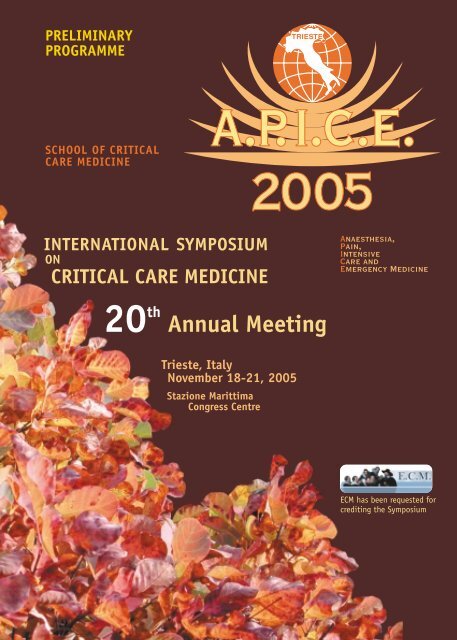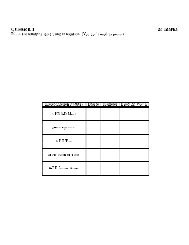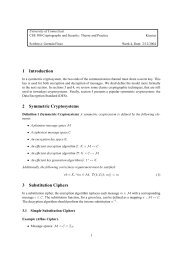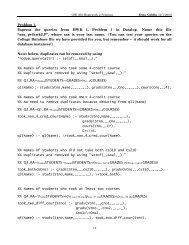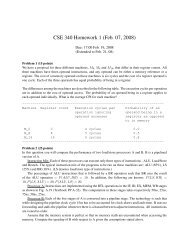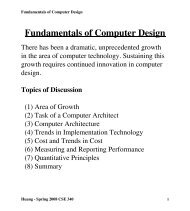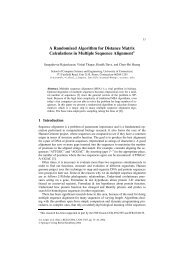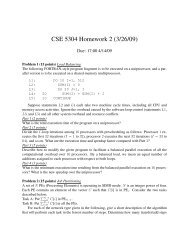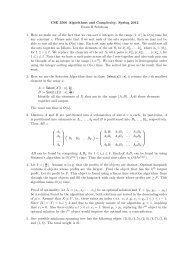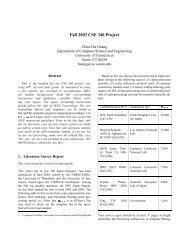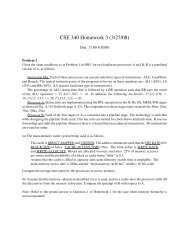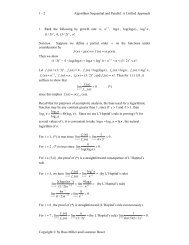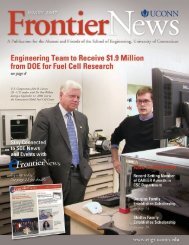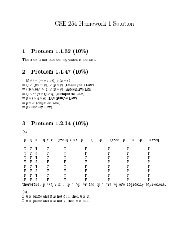general informa tion
general informa tion
general informa tion
Create successful ePaper yourself
Turn your PDF publications into a flip-book with our unique Google optimized e-Paper software.
In coopera<strong>tion</strong> with<br />
Club A.P.I.C.E.<br />
Department of Perioperative<br />
Medicine, Intensive Care<br />
and Emergency<br />
Cattinara University - Hospital<br />
School of Medicine, Trieste, Italy<br />
Tel.: +39 040 3994540<br />
Fax: +39 040 912278<br />
a.gullo@fmc.units.it<br />
MEETING CHAIRMAN<br />
Prof. Antonino Gullo<br />
Department of Perioperative Medicine, Intensive Care<br />
and Emergency<br />
Cattinara University - Hospital<br />
School of Medicine, Trieste, Italy<br />
Tel: +39 040 3994540<br />
Fax: +39 040 912278<br />
a.gullo@fmc.units.it<br />
Affiliated with<br />
The Institute of Critical Care Medicine<br />
Palm Springs, CA, USA<br />
World Federa<strong>tion</strong><br />
of Societies of Intensive<br />
and Critical Care Medicine<br />
Confedera<strong>tion</strong> of<br />
European Na<strong>tion</strong>al Societies<br />
of Anaesthesiology<br />
European Society of<br />
Emergency Medicine<br />
W.F.S.A. World Federa<strong>tion</strong><br />
of Societies of<br />
Anaesthesiologists<br />
The President of the Italian Republic<br />
Ministero dell’Istruzione, dell’Università e della Ricerca<br />
Ministero della Salute<br />
Istituto Superiore di Sanità<br />
S.I.A.A.R.T.I. Società Italiana di Anestesia, Analgesia,<br />
Rianimazione e Terapia Intensiva<br />
A.A.R.O.I. Associazione Anestesisti Rianimatori<br />
Ospedalieri Italiani<br />
S.I.T.I. Società Italiana di Terapia Intensiva<br />
Ordine dei Medici Chirurghi e degli Odontoiatri<br />
della Provincia di Trieste<br />
Università degli Studi di Trieste<br />
Facoltà di Medicina e Chirurgia, Università degli Studi<br />
di Trieste<br />
Azienda Ospedaliera Ospedali Riuniti di Trieste<br />
Regione Autonoma Friuli-Venezia Giulia<br />
Provincia di Trieste<br />
Comune di Trieste<br />
The above institu<strong>tion</strong>s have been invited to grant their patronage<br />
A.P.I.C.E. SECRETARIAT<br />
Key Congressi<br />
Piazza della Borsa, 7 - 34121 Trieste, Italy<br />
Phone: +39 040 660 352 / +39 040 362 727<br />
Fax: +39 040 660 353<br />
apice@keycongressi.it www.keycongressi.it
INTERNATIONAL SYMPOSIUM<br />
ON<br />
CRITICAL CARE MEDICINE<br />
20 th Annual Meeting<br />
Trieste, Italy<br />
November 18-21, 2005<br />
HONORARY PRESIDENT<br />
M.H. Weil (U.S.A.)<br />
SCIENTIFIC COMMITTEE<br />
J.O.C. Auler (Brazil)<br />
L. Berggren (Sweden)<br />
G. Berlot (Italy)<br />
S. Bhagwanjee (South Africa)<br />
J.F. Bion (U.K.)<br />
V. Carpino (Italy)<br />
M. Castagneto (Italy)<br />
E. Cohen (U.S.A.)<br />
L. Gattinoni (Italy)<br />
G. Giron (Italy)<br />
G. Hedenstierna (Sweden)<br />
P.D. Lumb (U.S.A.)<br />
C. Ori (Italy)<br />
V. Paver Eržen (Slovenia)<br />
G. Ramsay (The Netherlands)<br />
M. Ranieri (Italy)<br />
C. Ronco (Italy)<br />
L. Silvestri (Italy)<br />
R.G.G. Terzi (Brazil)<br />
R. Tufano (Italy)<br />
H.K.F. Van Saene (U.K.)<br />
J.L. Vincent (Belgium)<br />
M.H. Weil (U.S.A.)<br />
D.J. Wilkinson (U.K.)<br />
W.A. Zin (Brazil)<br />
JUNIOR SCIENTIFIC COMMITTEE<br />
A. Agosti (Italy)<br />
F. Bernabè (Italy)<br />
G. Cammarata (Italy)<br />
M.L. Chierego (Italy)<br />
T. Pellis (U.K.)<br />
A. Peratoner (Italy)<br />
F. Rubulotta (Belgium)<br />
D. Taglieri (U.S.A.)<br />
SENIOR SCIENTIFIC COMMITTEE<br />
V. Antonaglia (Italy)<br />
D. Caristi (Italy)<br />
P. Di Marco (Italy)<br />
S. Fasiolo (Italy)<br />
U. Lucangelo (Italy)<br />
A. Rinaldi (Italy)<br />
A. Rotigni (Italy)<br />
L. Serra (Italy)<br />
COMPUTERS AND TECHNOLOGICAL SUPPORT<br />
P. Demanins<br />
L. Zucchi<br />
VENUE<br />
Stazione Marittima<br />
Congress Centre<br />
Molo Bersaglieri 3, Trieste,<br />
Italy<br />
LANGUAGE<br />
Official languages are English and Italian.<br />
Simultaneous transla<strong>tion</strong> will be available<br />
in all scientific sessions, except for poster<br />
sessions and where otherwise specified.<br />
3
FOGLIO ILLUSTRATIVO<br />
APICE 2005 – Programma ECM<br />
DENOMINAZIONE: Educazione Continua in Medicina<br />
COMPOSIZIONE: Non potendo accreditare l’intero<br />
Simposio APICE abbiamo individuato 17 percorsi<br />
formativi, ognuno dei quali dà diritto a distinti<br />
punteggi E.C.M.<br />
SOLO PER VENERDÌ 18 TUTTE LE SALE VERRANNO<br />
ACCREDITATE come sessioni contemporanee e CON<br />
UN UNICO “MONTE PUNTI”.<br />
FORMA: Percorsi formativi.<br />
TITOLARE: A.P.I.C.E. (Anaesthesia, Pain, Intensive<br />
Care and Emergency Medicine).<br />
PRODOTTO E CONTROLLATO DA: D.G.M.P. di Pisa.<br />
INDICAZIONI: A partire dalle ore 13:30 di venerdì<br />
18 saranno raccolte le adesioni per i singoli<br />
moduli organizzati sabato, domenica e lunedì. Per<br />
avere maggiori possibilità di scelta, i partecipanti<br />
sono invitati a presentarsi al più presto alla preiscrizione<br />
dei corsi di loro interesse in quanto l’accettazione<br />
avverrà in ordine di presentazione ai desk<br />
(fino ad esaurimento dei posti disponibili in ciascuna<br />
sala).<br />
AVVERTENZE: Verrà stabilito un numero massimo<br />
di partecipanti per ogni sessione, numero che verrà<br />
determinato dalle modalità di accreditamento e<br />
dalla capienza delle sale.<br />
INTERAZIONI: Tutti i corsi sono stati accreditati<br />
per la categoria dei medici e, nei 7 casi precisati, anche<br />
per la categoria degli infermieri professionali.<br />
Non sono stati richiesti accreditamenti per altre categorie.<br />
SITUAZIONI PARTICOLARI: Si tenga presente in<br />
modo particolare che il corso Critical Care Practice<br />
si ripeterà per due edizioni (mattina di sabato 19<br />
novembre e mattina di lunedì 21 novembre); ciascuna<br />
edizione è riservata ad un numero massimo<br />
di 30 persone. Si pregano pertanto i partecipanti interessati<br />
a presentarsi per tempo al relativo desk.<br />
Crediti per i Docenti<br />
I Docenti/Relatori hanno diritto, previa richiesta all’organizzatore,<br />
a 2 crediti formativi per ogni ora<br />
effettiva di docenza in eventi o progetti formativi<br />
accreditati ECM entro il limite del 50% di crediti<br />
formativi da acquisire nel corso dell’anno solare. I<br />
crediti possono essere acquisiti in considerazione<br />
esclusivamente delle ore effettive di lezione; i crediti<br />
non possono, cioè, essere frazionati o aumentati<br />
in ragione dell’impegno inferiore o superiore ai<br />
60 minuti di lezione (le lezioni di durata inferiore ai<br />
60 minuti non possono essere prese in considerazione,<br />
né possono cumularsi frazioni di ora per docenze<br />
effettuate in eventi diversi).<br />
I docenti/relatori possono conseguire solo i<br />
predetti crediti ECM; essi non possono conseguire<br />
i crediti formativi in qualità di partecipanti<br />
ad eventi nei quali effettuano attività di<br />
docenza.<br />
L’organizzatore è responsabile della corretta attestazione<br />
dei crediti.<br />
Tolleranza per i tempi di partecipazione.<br />
Ai fini dell’attestazione dei crediti formativi ECM è<br />
necessaria la presenza effettiva degli operatori sanitari<br />
al 100% della durata del corso di interesse.<br />
Un’attenta analisi del programma permetterà di individuare<br />
il percorso migliore per le proprie esigenze<br />
formative.<br />
CRITERI PER LA DISTRIBUZIONE DEI CREDITI I<br />
crediti da acquisire nel primo quinquennio sono<br />
stati fissati in 150 con la seguente progressione:<br />
2002. 10 crediti (con un minimo di 5 e un massimo di 20)<br />
2003. 20 crediti (con un minimo di 10 e un massimo di 40)<br />
2004. 30 crediti (con un minimo di 15 e un massimo di 60)<br />
2005. 40 crediti (con un minimo di 20 e un massimo di 80)<br />
2006. 50 crediti (con un minimo di 25 e un massimo di 100)<br />
SCADENZA: Le indicazioni riguardo ai punti attribuiti<br />
a ciascun corso saranno on line a partire<br />
da settembre (www.keycongressi.it)<br />
Ulteriori <strong>informa</strong>zioni possono essere richieste all’indirizzo<br />
apice@keycongressi.it<br />
PREZZO AL PUBBLICO: L’adesione al programma<br />
ECM di APICE 2005 è incluso nella quota di<br />
iscrizione (sezione D della scheda di registrazione),<br />
che garantisce al partecipante la possibilità<br />
di frequentare qualunque sessione accreditata secondo<br />
le preferenze e di ricevere il/i certificato/i<br />
d’attestazione dei crediti accumulati nel corso del<br />
Simposio.<br />
IMPORTANTE! Il presente schema dei corsi ha valore<br />
indicativo. L’ordine e i contenuti delle sessioni<br />
potranno essere modificati in conseguenza<br />
delle necessità dei docenti o per esigenze organizzative.<br />
Invitiamo i partecipanti a consultare gli<br />
aggiornamenti che saranno tempestivamente resi<br />
disponibili sul sito della segreteria organizzativa<br />
www.keycongressi.it<br />
5
A F T E R N O O N<br />
PRELIMINARY<br />
PROGRAMME<br />
Friday 18 November<br />
ROOM 1 ROOM 2 ROOM 3 ROOM 4 ROOM 5 ROOM 6<br />
ETHICS<br />
The ethics of care in ICU<br />
Advanced directives: legal and<br />
ethical considera<strong>tion</strong>s<br />
Withholding and withdrawing<br />
medical treatment<br />
Quality of life after ICU<br />
OPENING CEREMONY<br />
Talking about the school<br />
HELMET CPAP IN CHILDREN<br />
CO 2 rebreathing during helmet<br />
CPAP<br />
Helmet CPAP in paediatric ARF<br />
Helmet CPAP in preterm infants<br />
BAL during helmet CPAP<br />
CLINICAL ASSESSMENT<br />
AND MONITORING OF CENTRAL<br />
NERVOUS SYSTEM<br />
- Introduc<strong>tion</strong> on clinical<br />
assessment of the central<br />
nervous system<br />
- Monitoring of the central<br />
nervous system<br />
- Diagnosis of cerebral death<br />
RESPIRATORY SYSTEM AND<br />
KIDNEY IN CRITICAL CARE<br />
Respiratory system<br />
- Advances on understanding<br />
respiratory physiology<br />
- Grading severity of respiratory<br />
dysfunc<strong>tion</strong><br />
- Membrane and pump failure<br />
Kidney<br />
- Advances on understanding<br />
renal physiology<br />
- Func<strong>tion</strong>al reserve<br />
- Genetic predisposi<strong>tion</strong> to renal<br />
dysfunc<strong>tion</strong>/failure<br />
CRITICAL ASPECTS IN TRAUMA<br />
- Indica<strong>tion</strong>s and timing of<br />
intracranial pressure monitoring<br />
- Ventilatory management of brain<br />
injured patients<br />
- Management of ventilatorassociated<br />
pneumonia in brain<br />
injured patients<br />
DISASTER MEDICINE<br />
Defini<strong>tion</strong>, organisa<strong>tion</strong> and<br />
outcome<br />
The role of telemedicine in<br />
disasters<br />
Terrorist attacks – what we have<br />
learnt<br />
Chemical and biological attacks<br />
Critical care in the changing<br />
world
Saturday 19 November<br />
ROOM 1 ROOM 2 ROOM 3 ROOM 4 ROOM 5 ROOM 6<br />
CRITICAL CARE PRACTICE<br />
1 st edi<strong>tion</strong><br />
TRAUMA OPERATIVE<br />
PROCEDURES (TOP)<br />
FLUID, ELECTROLYTES<br />
AND ACID-BASE BALANCE<br />
IN CRITICAL CARE<br />
CARDIOPULMONARY<br />
CRITICAL CARE<br />
CARDIOVASCULAR ADVANCES<br />
Invited lecture:<br />
CoBaTrICE implica<strong>tion</strong>s for<br />
European intensivists<br />
Invited lecture:<br />
Cardiac output and gas<br />
exchange coupling<br />
POSTGRADUATE COURSE ON<br />
SEVERITY SCORES AND<br />
NURSING WORKLOAD USE<br />
SCORES<br />
M O R N I N G<br />
Airway Management<br />
- Assessment<br />
- Techniques<br />
- The difficult patient<br />
- DLT, Univent and bronchial<br />
blockers<br />
Introduc<strong>tion</strong> to trauma care and<br />
improving performance<br />
The physiologic response to<br />
trauma and the scoring system<br />
Regulatory mechanism of acidbase<br />
balance<br />
Importance of the anion gap<br />
Monitoring of arterial pressure<br />
Pre-hospital therapy<br />
Strong ion difference<br />
Weak acid and water<br />
Perioperative myocardial<br />
ischaemia<br />
Organisa<strong>tion</strong> prior to trauma<br />
arrival and priorities<br />
Oesophageal pacing and<br />
cardioversion-defibrilla<strong>tion</strong><br />
Cardiac mechano-electric<br />
feedback: role in the<br />
management of arrhythmia<br />
The atrial fibrilla<strong>tion</strong> case:<br />
enlargement, remodelling,<br />
arrhythmias<br />
Ventricular volume overload:<br />
effects on fibrilla<strong>tion</strong> and<br />
defibrilla<strong>tion</strong> thresholds<br />
Chronic mechanical unloading:<br />
from medieval blood-letting to<br />
modern pharmacological<br />
therapies<br />
Cardiac mechanical assist:<br />
passive versus active devices<br />
Cardiac resynchronisa<strong>tion</strong><br />
therapy: current advances and<br />
future direc<strong>tion</strong>s<br />
Risk adjustment in the critically ill<br />
patient: what is worthwhile and<br />
why?<br />
attendance limited<br />
to 30 participants<br />
Clinical care practice<br />
Metabolic alkalosis<br />
Imaging of trauma patients<br />
The unstable trauma patient<br />
Lodox modalities<br />
Modes of artificial ventila<strong>tion</strong><br />
Evalua<strong>tion</strong> of severity of illness<br />
and prognosis<br />
Respiratory alkalosis<br />
Metabolic acidosis<br />
Respiratory acidosis<br />
Lung protective ventilatory<br />
strategies<br />
Can we identify patients who<br />
need intensive care?<br />
Cardiovascular effects of artificial<br />
ventila<strong>tion</strong><br />
Invited lecture:<br />
Neurocritical trauma patients<br />
Evalua<strong>tion</strong> of organ dysfunc<strong>tion</strong> /<br />
failure<br />
Invited lecture:<br />
Autologous bone marrow/stem<br />
cell transplanta<strong>tion</strong> in<br />
ischaemic cardiomyopathy.<br />
Initial clinical results<br />
CPR from evidence to guidelines<br />
Advances in CPR<br />
Acute coronary interven<strong>tion</strong>s for<br />
victims of sudden death<br />
Ventila<strong>tion</strong> strategies during CPR<br />
Risk adjustment in the infected<br />
patient<br />
TRAUMA OPERATIVE<br />
PROCEDURES (TOP)<br />
FLUID, ELECTROLYTES AND<br />
ACID-BASE BALANCE IN<br />
CRITICAL CARE<br />
ORGAN PROTECTION AND<br />
TOXICITY OF ANAESTHETICS<br />
CARDIOVASCULAR ADVANCES<br />
POSTGRADUATE COURSE ON<br />
SEVERITY SCORES AND NURSING<br />
WORKLOAD USE SCORES<br />
A F T E R N O O N<br />
Acute mechanical stimula<strong>tion</strong> for<br />
reversal of arrhythmia (pre-cordial<br />
thump): risks and benefits<br />
10 th ETAIC MEETING<br />
New strategies in the evalua<strong>tion</strong><br />
and management of abdominal<br />
trauma<br />
Microcircula<strong>tion</strong><br />
Perfusion optimisa<strong>tion</strong><br />
Trieste-Ljubljana universities<br />
cooperative programme for<br />
educa<strong>tion</strong> and training in<br />
anaesthesiology and intensive<br />
care<br />
Major thoracic injuries<br />
Lactic acidosis<br />
Cell injury score<br />
Mechanism of ac<strong>tion</strong> of<br />
anaesthetics<br />
Metabolism and neuroprotec<strong>tion</strong> /<br />
neurotoxicity<br />
Neuroprotec<strong>tion</strong> by NMDA<br />
anaesthetics<br />
Neurotoxicity of NMDA<br />
anaesthetics<br />
Neurotoxicity of local anaesthetics<br />
Neuroprotec<strong>tion</strong> by common<br />
anaesthetics<br />
Neurotoxicity of common<br />
anaesthetics<br />
Inhaled or intravenous<br />
anaesthetics for neurosurgical<br />
anaesthesia<br />
Xenon<br />
Neuroprotec<strong>tion</strong> by<br />
dexmedetomidine<br />
Electrical and pharmacological<br />
interven<strong>tion</strong>s<br />
Dangerous mistakes in the initial<br />
evalua<strong>tion</strong> and management of<br />
the geriatric trauma patient<br />
Thrombolysis during CPR<br />
Missed injury in trauma<br />
Fluid, electrolytes and acidbase<br />
control in critical<br />
condi<strong>tion</strong>s<br />
Acute diabetic emergencies<br />
Minimising reperfusion injury in<br />
settings of global myocardial<br />
ischaemia<br />
Noninvasive monitoring in the<br />
multitrauma patients<br />
Haemorrhagic shock<br />
Pump failure<br />
Septic shock<br />
Global hypothermia for<br />
neuroprotec<strong>tion</strong> after cardiac<br />
arrest<br />
Panel:<br />
Trauma operative procedures<br />
The dark side of the moon: inhospital<br />
CPR<br />
Invited lecture:<br />
Traumatic injuries in pregnancy<br />
Panel:<br />
Trauma Cases<br />
Panel:<br />
CPR guidelines 2005: what is<br />
new under the sun?<br />
Risk adjustment in patients after<br />
cardiac surgery<br />
The evalua<strong>tion</strong> of nursing<br />
workload in intensive care<br />
Evaluating quality of life after<br />
intensive care<br />
Using severity scores and nursing<br />
workload scores as management<br />
tools<br />
Monitoring process quality in<br />
intensive care<br />
Can we compare the performance<br />
of ICUs?<br />
How to evaluate the performance<br />
in intensive care: a lesson from<br />
30 years<br />
Can the nurses/patients ratio be a<br />
critical point to evaluate quality of<br />
care?<br />
7
M O R N I N G<br />
A F T E R N O O N<br />
8Sunday 20 November<br />
ROOM 1 ROOM 2 ROOM 3 ROOM 4 ROOM 5 ROOM 6<br />
CHALLENGES IN<br />
PERIOPERATIVE MEDICINE<br />
Perioperative transfusion<br />
Critical levels of haemoglobin in<br />
surgical patients<br />
Severe haemodilu<strong>tion</strong>: pulmonary<br />
effects<br />
Severe bleeding in critical care<br />
Perioperative medicine<br />
Patient consensus in difficult<br />
situa<strong>tion</strong>s<br />
Operating theatre organisa<strong>tion</strong><br />
Posi<strong>tion</strong>ing<br />
Submental intuba<strong>tion</strong> in trauma<br />
and maxillofacial surgery<br />
CHALLENGES IN<br />
PERIOPERATIVE MEDICINE<br />
Perioperative medicine<br />
Difficult airway management<br />
Drug interac<strong>tion</strong>s in anaesthetic<br />
practice<br />
Invited lecture:<br />
Does anaesthesia influence<br />
apoptosis pathways?<br />
Neuroanaesthesia<br />
One-lung ventila<strong>tion</strong> in thoracic<br />
surgery<br />
Anaesthesia for orthopaedic<br />
surgery<br />
Costs in anaesthesia<br />
Invited lecture:<br />
Biomedical computa<strong>tion</strong> on the<br />
grid<br />
14 th Organ Failure<br />
Academy(OFA) Meeting<br />
SEPSIS AND ORGAN<br />
DYSFUNCTION - FROM BASICS<br />
TO STANDARD OF CARE<br />
- Basics of molecular biology<br />
- Methods used in molecular<br />
biology<br />
- Applica<strong>tion</strong>s of molecular<br />
biology in medical practice and<br />
research<br />
Sepsis and the immune system<br />
Pathogenesis of cellular<br />
dysfunc<strong>tion</strong> in sepsis<br />
Endothelial inflamma<strong>tion</strong> and<br />
coagula<strong>tion</strong><br />
Invited lecture:<br />
Genetic predisposi<strong>tion</strong> to sepsis<br />
SEPSIS AND ORGAN<br />
DYSFUNCTION - FROM BASICS<br />
TO STANDARD OF CARE<br />
Sepsis in the elderly<br />
Sequential organ failure<br />
assessment<br />
Combined therapeutic<br />
interven<strong>tion</strong> in sepsis<br />
Planning survival strategies<br />
Surviving sepsis campaign<br />
Bundle technology for introducing<br />
change<br />
Patient safety issues<br />
Preven<strong>tion</strong> of infec<strong>tion</strong>s<br />
Panel:<br />
Implementa<strong>tion</strong> of guidelines<br />
EVIDENCE BASED MEDICINE IN<br />
THE PERIOPERATIVE SETTING<br />
- OR management – applying<br />
logistic principles to medical<br />
patients<br />
- To fill or not to fill – volume<br />
management in trauma cases<br />
- Clinical anaesthesia<br />
management with resources<br />
shortage<br />
Perioperative assessment and<br />
management of high-risk<br />
patients<br />
Risk assessment and decisionmaking<br />
Standardisa<strong>tion</strong> procedures<br />
Is B-type natriuretic peptide (BNP)<br />
a predictor of heart failure?<br />
Risk evalua<strong>tion</strong> for non cardiac<br />
surgery<br />
EVIDENCE BASED MEDICINE IN<br />
THE PERIOPERATIVE SETTING<br />
Left ventricular systolic and<br />
diastolic dysfunc<strong>tion</strong><br />
Pacemaker resynchronisa<strong>tion</strong> in<br />
the treatment of severe heart<br />
failure<br />
Cerebral protec<strong>tion</strong>, is it possible<br />
to prevent it?<br />
Perioperative critical care in<br />
obstetrics<br />
Perioperative renal dysfunc<strong>tion</strong><br />
Invited lecture:<br />
Quality of care (audit) in<br />
perioperative care<br />
Panel:<br />
Focus on abdominal<br />
compartment syndrome<br />
FOCUS ON ANTIBIOTICS – USE<br />
AND MISUSE IN THE ICU<br />
Introduc<strong>tion</strong><br />
Classifica<strong>tion</strong> of antibiotics<br />
Pharmacodynamics<br />
Criteria for the choice of<br />
antibiotics<br />
The use of antibiotics<br />
Evidence for immediate adequate<br />
parenteral antibiotics<br />
Evidence for immediate enteral<br />
plus parenteral antibiotics<br />
The misuse of antibiotics<br />
Defini<strong>tion</strong> of misuse of antibiotics<br />
Clinical and microbiological<br />
impact of misuse of antibiotics<br />
FOCUS ON ANTIBIOTICS – USE<br />
AND MISUSE IN THE ICU<br />
Antimicrobial resistance<br />
Pathophysiology<br />
Parenteral vs enteral plus<br />
parenteral antibiotics<br />
Monitoring<br />
Antibiotics monitoring<br />
Antibiotics in renal impairment<br />
Nebulised antibiotics for<br />
treating ventilator-associated<br />
pneumonia<br />
Interactive cases report<br />
HIGHLIGHT ON PULMONARY<br />
REMODELLING<br />
Monitoring of respiratory<br />
mechanics during artificial<br />
ventila<strong>tion</strong><br />
Effects of mechanical ventila<strong>tion</strong><br />
at low lung volume on respiratory<br />
mechanics<br />
Evalua<strong>tion</strong> of pressure-volume<br />
curves<br />
End-tidal CO2 monitoring<br />
Blood gas monitoring<br />
Perioperative recruitment<br />
manoeuvres<br />
Physiopathology of atelectasis<br />
during anaesthesia<br />
How and when to recruit lungs<br />
during anaesthesia<br />
CT evalua<strong>tion</strong> of recruitment<br />
manoeuvres during anaesthesia<br />
for cardiac surgery<br />
Bedside lung echography in<br />
patients with acute lung injury<br />
HIGHLIGHT ON PULMONARY<br />
REMODELLING<br />
Pulmonary remodelling in ARDS<br />
Part I<br />
Cellular responses to mechanical<br />
stress<br />
Matrix in the lung: the forgotten<br />
friend<br />
Mechanism of repairing and<br />
remodelling in ARDS<br />
Part II<br />
Lung parenchyma remodelling<br />
and tissue mechanics<br />
Strategies to modify lung<br />
parenchyma remodelling in ARDS<br />
Stress and strain lung significance<br />
Meet the expert:<br />
How do I ventilate my ARDS<br />
patients<br />
Meet the expert:<br />
Inflamma<strong>tion</strong> - role on NO and CO<br />
COMPUTING SYSTEM<br />
MANAGEMENT FOR MEDICAL<br />
DIRECTORS<br />
Medical consultant computing in<br />
anaesthesia and intensive care<br />
Anaesthesia and intensive care<br />
networking<br />
Internet and intranet in<br />
anesthesia and intensive care<br />
Database for archiving patients<br />
data<br />
Digital signature, crittography,<br />
certifica<strong>tion</strong> and digital<br />
archivia<strong>tion</strong><br />
COMPUTING SYSTEM<br />
MANAGEMENT FOR MEDICAL<br />
DIRECTORS<br />
Networking safety<br />
Computing – monitoring<br />
connec<strong>tion</strong> and point of care<br />
Anaesthesia and intensive care<br />
networking for distance learning<br />
Computing and networking for<br />
medical director
M O R N I N G<br />
Monday 21 November<br />
ROOM 1 ROOM 2 ROOM 3 ROOM 4 ROOM 5 ROOM 6<br />
CRITICAL CARE PRACTICE<br />
2 nd edi<strong>tion</strong><br />
HIGHLIGHT ON PULMONARY<br />
REMODELLING<br />
ANALYSIS OF ARTERIAL PULSE<br />
MICRODIALYSIS<br />
Principles and techniques<br />
Experimental data<br />
ACUTE PAIN SERVICE<br />
CHALLENGES IN PERIOPERATIVE<br />
MEDICINE<br />
Airway management<br />
- Assessment<br />
- Techniques<br />
- The difficult patient<br />
- DLT, Univent and bronchial<br />
blockers<br />
New insight in the treatment of<br />
ARDS<br />
Part I<br />
Nitric oxide should be used in<br />
ARDS<br />
Postoperative pain - what is new<br />
in 2005?<br />
Organisa<strong>tion</strong> of an APS<br />
Invited lecture:<br />
Anaesthesia and seda<strong>tion</strong><br />
outside the OR<br />
Focus on clinical applica<strong>tion</strong><br />
Subarachnoid haemorrhage<br />
Acute pain management in<br />
children<br />
Corticosteroids in ARDS: back to<br />
the future<br />
Ventilatory-metabolic monitoring<br />
and analysis of arterial pulse<br />
Analysis of arterial pulse and<br />
ventricular devices<br />
Haemodynamic and metabolic<br />
monitoring in sepsis: the role of<br />
analysis of arterial pulse<br />
Study of diastolic phase in the<br />
critically ill patient<br />
Peritoneal microdiaysis<br />
Complica<strong>tion</strong>s in pain<br />
management<br />
Practice recommenda<strong>tion</strong>s in<br />
perioperative care<br />
Cardiac risk stratifica<strong>tion</strong><br />
attendance limited<br />
to 30 participants<br />
Exogenous surfactant<br />
replacement in ARDS<br />
Pain management and quality of<br />
life<br />
Anticoagula<strong>tion</strong> in regional<br />
anaesthesia<br />
Part II<br />
High vs. low PEEP in ARDS<br />
Invited lecture:<br />
Perioperative cardiovascular<br />
monitoring. Where we are in 2005<br />
Practice recommenda<strong>tion</strong>s and<br />
guidelines for PAC<br />
Recruitment manoeuvres in<br />
ARDS. When should they be<br />
performed<br />
Seminar:<br />
The anaesthesia specialty in<br />
the new European Community<br />
- Legal regula<strong>tion</strong>s for clinical<br />
practice<br />
- Organisa<strong>tion</strong> of the specialty in<br />
the European Community<br />
- Perspectives for specialists in<br />
private and public hospitals<br />
Practice recommenda<strong>tion</strong>s for<br />
obstetrical anaesthesia<br />
Clinical relevance of recruiters vs.<br />
non recruiters<br />
Invited lecture:<br />
Decision-making in postanaesthesia<br />
care<br />
Panel:<br />
Difficult weaning<br />
Look to the future...<br />
<strong>informa</strong><strong>tion</strong> and updates on<br />
www.apicetrieste.org<br />
9
TENTATIVE LIST OF SPEAKERS<br />
Antonelli Massimo (Italy)<br />
Almeida de Oliveira Sergio<br />
(Brazil)<br />
Alvisi Raffaele (Italy)<br />
Atlee John L. (U.S.A.)<br />
Auler José O. C. (Brazil)<br />
Baker David J. (France)<br />
Baldisseri Marie (U.S.A.)<br />
Barrett Stephen P. (U.K.)<br />
Behringer Wilhelm (Austria)<br />
Berlot Giorgio (Italy)<br />
Bion Julian F. (U.K.)<br />
Boldt Joachim (Germany)<br />
Borghi Giovan Battista (Italy)<br />
Böttiger Bernd W. (Germany)<br />
Braschi Antonio (Italy)<br />
Brienza Nicola (Italy)<br />
Calderini Edoardo (Italy)<br />
Capuzzo Maurizia (Italy)<br />
Caristi Daniela (Italy)<br />
Carpino Vincenzo (Italy)<br />
Castagneto Marco (Italy)<br />
Cerchiari Erga (Italy)<br />
Chidini Giovanna (Italy)<br />
Chierego Maria Luisa (Italy)<br />
Cohen Edmond (U.S.A.)<br />
Cohen Jonathan (U.K.)<br />
De Backer Daniel (Belgium)<br />
De Gaudio Angelo Raffaele<br />
(Italy)<br />
De La Cal Miguel A. (Spain)<br />
Della Corte Francesco (Italy)<br />
Dellinger R. Phillip (U.S.A.)<br />
Delogu Giovanna (Italy)<br />
Demetriades Demetrios (U.S.A.)<br />
DeVita Michael (U.S.A.)<br />
Drenger Benjamin (Israel)<br />
Dzoljic Misa (The Netherlands)<br />
Emmi Vincenzo (Italy)<br />
Facco Enrico (Italy)<br />
Fantoni Cecilia (Germany)<br />
Fodale Vincenzo (Italy)<br />
Foëx Pierre (U.K.)<br />
Freo Ulderico (Italy)<br />
Freye Enno (Germany)<br />
Fumagalli Roberto (Italy)<br />
Gattinoni Luciano (Italy)<br />
10<br />
Gazmuri Raúl J. (U.S.A.)<br />
Gerlach Herwig (Germany)<br />
Giomarelli Pierpaolo (Italy)<br />
Girardis Massimo (Italy)<br />
Giron Giampiero (Italy)<br />
Gordini Giovanni (Italy)<br />
Gullo Antonino (Italy)<br />
Hedenstierna Göran (Sweden)<br />
Hiesmayr Michael (Austria)<br />
Hillman Ken (Australia)<br />
Huang Chun-Hsi (U.S.A.)<br />
Iapichino Gaetano (Italy)<br />
Ince Can (The Netherlands)<br />
Jevtovic-Todorovic Vesna (U.S.A.)<br />
Kellum John A. (U.S.A.)<br />
Klimek Markus (The Netherlands)<br />
Klotz Stefan (Germany)<br />
Kochs Eberhard (Germany)<br />
Kohl Peter (U.K.)<br />
Lachmann Burkhard (The<br />
Netherlands)<br />
Lanza Vincenzo (Italy)<br />
Latronico Nicola (Italy)<br />
Laurent Geoffrey J. (U.K.)<br />
Le Gall Jean-Roger (France)<br />
Levi Marcel (The Netherlands)<br />
Levy Mitchell M. (U.S.A.)<br />
Leykin Yigal (Italy)<br />
Lingnau Werner (Austria)<br />
Lottan Michael (Israel)<br />
Lucangelo Umberto (Italy)<br />
Lumb Philip D. (U.S.A.)<br />
Maas Andrew I.R.<br />
(The Netherlands)<br />
Malbouisson Luiz M. (France)<br />
Markstaller Klaus (Switzerland)<br />
Metnitz Philipp G.H. (Austria)<br />
Milic-Emili Joseph (Canada)<br />
Mira Jean-Paul (France)<br />
Morales Marcelo M. (Brazil)<br />
Moreno Rui (Portugal)<br />
Morra Antonio (Italy)<br />
Muchada Raoul (France)<br />
Nardi Giuseppe (Italy)<br />
Noc Marko (Slovenia)<br />
Nordstrom Carl Henrik (Sweden)<br />
Opal Steven M. (U.S.A.)<br />
Ori Carlo (Italy)<br />
Palazzo Mark (U.K.)<br />
Patel Piyush (U.S.A.)<br />
Paver-Eržen Vesna (Slovenia)<br />
Pea Federico (Italy)<br />
Pellis Tommaso (U.K.)<br />
Pelosi Paolo (Italy)<br />
Pesenti Antonio (Italy)<br />
Pittoni Giovanni (Italy)<br />
Plani Frank (South Africa)<br />
Pozzi Mucelli Roberto (Italy)<br />
Ramsay Graham (The<br />
Netherlands)<br />
Ranieri Marco V. (Italy)<br />
Reinstrup Peter (Sweden)<br />
Rocco Patricia (Brazil)<br />
Rodriguez Blanca (U.K.)<br />
Ronco Claudio (Italy)<br />
Rouby Jean-Jacques (France)<br />
Rubulotta Francesca (Belgium)<br />
Rupreht Joseph (The Netherlands)<br />
Ruskin Keith J. (U.S.A.)<br />
Sajeva Marco (Italy)<br />
Salvo Ida (Italy)<br />
Schiraldi Fernando (Italy)<br />
Schotten Ulrich (The Netherlands)<br />
Scolletta Sabino (Italy)<br />
Sganga Gabriele (Italy)<br />
Silvestri Luciano (Italy)<br />
Singer Pierre (Israel)<br />
Sorbara Carlo (Italy)<br />
Stadler Michaela (Belgium)<br />
Terzi Renato G.G. (Brazil)<br />
Trevisanuto Daniele (Italy)<br />
Tufano Rosalba (Italy)<br />
Tulli Giorgio (Italy)<br />
Ungerstedt Urban (Sweden)<br />
Van der Linden Philippe<br />
(Belgium)<br />
Van Saene Hendrick K.F. (U.K.)<br />
Vincent Jean-Louis (Belgium)<br />
Viviani Marino (Italy)<br />
Volk Hans-Dieter (Germany)<br />
Weil Max H. (U.S.A.)<br />
Wilkinson David J. (U.K.)<br />
Zimpfer Michael (Austria)<br />
Zin Walter (Brazil)
HOTEL ACCOMMODATION<br />
Early booking is recommended. Requests for hotel reserva<strong>tion</strong>s should be made to the<br />
A.P.I.C.E. 2005 Secretariat not later than October 15, 2005. For reserva<strong>tion</strong> fill in<br />
sec<strong>tion</strong> “E” of the registra<strong>tion</strong> form. Hotel rooms will be assigned on a first-come, firstserved<br />
basis and every attempt will be made to respect your choice. If the selected<br />
hotel is not available, reserva<strong>tion</strong> will be made in a hotel of equivalent category<br />
according to availability. If single rooms are not available, Double rooms Used as<br />
Single (DUS) will be booked, and vice versa.<br />
No reserva<strong>tion</strong> will be accepted without the required deposit as indicated in the<br />
registra<strong>tion</strong> form.<br />
Deposit will be forwarded to the assigned hotel and will be deducted from the final<br />
bill to be settled directly at the hotel. The receipt for the total payment (deposit<br />
included) will be issued by the hotel. For credit card holders: your credit card will be<br />
used as a guarantee of reserva<strong>tion</strong>. Hotel cost will be charged on your credit card only<br />
if reserva<strong>tion</strong> is cancelled. Credit cards will be used only for this purpose.<br />
Hotel rates are quoted in Euro. Prices are meant per room per night and include<br />
breakfast and taxes.<br />
The Organisa<strong>tion</strong> has booked an adequate number of rooms in hotels of frequently<br />
requested categories. In case all rooms available are sold out, or in case of specific<br />
needs, the Secretariat may take care of your reserva<strong>tion</strong> in a different typology of<br />
lodging (bed&breakfast, residence, hostel, etc.). For further needs, do not hesitate to<br />
contact the Organisers, who will provide assistance and <strong>informa</strong><strong>tion</strong>.<br />
HOTEL CLASS SINGLE ROOM DOUBLE ROOM DOUBLE ROOM<br />
USED AS SINGLE<br />
HOTEL ✰✰✰✰✰ Not available 9 242,00 9 260,00<br />
HOTEL<br />
Min. 9 125,00 Min. 9 135,00 Min. 9 150,00<br />
✰✰✰✰<br />
Max. 9 128,00 Max. 9 208,00 Max. 9 257,00<br />
HOTEL<br />
Min. 9 95,00 Min. 9 100,00 Min. 9 100,00<br />
✰✰✰<br />
Max. 9 95,00 Max. 9 149,00 Max. 9 204,00<br />
GENERAL INFORMATION<br />
CANCELLATION AND REFUNDS<br />
Notifica<strong>tion</strong> of cancella<strong>tion</strong> must be made in writing to the A.P.I.C.E. 2005<br />
Secretariat. If cancella<strong>tion</strong> is notified before October 15, 2005, hotel cost for the first<br />
night booked will be charged. If cancella<strong>tion</strong> is notified after October 15, 2005, or in<br />
case of non-arrival or of early departure, the total cost for the nights booked will be<br />
charged.<br />
CONGRESS SECRETARIAT<br />
For on-site registra<strong>tion</strong>, the Secretariat will be available at the Congress Centre<br />
recep<strong>tion</strong> desk from Friday, November 18 at 13:30 to Monday, November 21.<br />
LUNCHES<br />
Meals are not included in the registra<strong>tion</strong> fee.<br />
A self-service restaurant will be open daily at the Congress Centre.<br />
EXHIBITION<br />
A technical, pharmaceutical and scientific exhibi<strong>tion</strong> will be held from November 18 to<br />
November 21 on the first floor of the Congress Centre.<br />
11
REGISTRATION<br />
REGISTRATION FEES<br />
All fees are quoted in Euro and inclusive of 20% VAT.<br />
• Before June 15, 2005<br />
Full registra<strong>tion</strong> fee: 9 470,00<br />
SIAARTI, AAROI members: 9 415,00<br />
Physicians in training*: 9 100,00<br />
Nurses: 9 150,00<br />
• After June 15, 2005<br />
Full registra<strong>tion</strong> fee: 9 520,00<br />
SIAARTI, AAROI members: 9 520,00<br />
Physicians in training*: 9 150,00<br />
Nurses: 9 200,00<br />
Daily Fee: 9 210,00<br />
One-day participa<strong>tion</strong> only<br />
Emerging Countries special fee: 9 150,00<br />
Offer limited to African, Asian, Latin American and Eastern European emerging countries<br />
*Registra<strong>tion</strong> form must enclose an accompanying letter certifying the physician in training<br />
status (anaesthesiology, internal medicine, surgery, paediatrics, neonatology).<br />
Fees include admission to the scientific sessions, 1 copy of the book of proceedings, certificate<br />
of attendance, and the possibility to attend any credited course and to receive the certificate(s)<br />
with the number of credits obtained during the Symposium (see p. 4 for a complete overview<br />
of APICE 2005 - ECM programme and instruc<strong>tion</strong>s).<br />
GENERAL INFORMATION<br />
HOW TO REGISTER<br />
Since A.P.I.C.E. attracts a huge number of participants, we warmly recommend to return by fax<br />
the filled-in Registra<strong>tion</strong> Form together with a payment certificate not later than October 15,<br />
2005 to the Secretariat:<br />
KEY CONGRESSI<br />
Piazza della Borsa 7 – 34121 Trieste, Italy<br />
Tel.: +39 040 660 352 / +39 040 362 727<br />
Fax: +39 040 660 353<br />
E-mail: apice@keycongressi.it<br />
Registra<strong>tion</strong>s will be accepted only upon regular payment of the registra<strong>tion</strong> fee.<br />
METHOD OF PAYMENT<br />
Payment of registra<strong>tion</strong> fee and hotel deposit should be made in Euro by:<br />
• Cheque made payable to “A.P.I.C.E. SRL”.<br />
• Bank transfer (free of charge for the beneficiary) to APICE srl, account n° 58126501,<br />
c/o Unicredit Banca, Agenzia Trieste Risparmio, ABI 02008 – CAB 02230.<br />
(IBAN: IT 24 G 02008 02230 000058126501).<br />
• Credit card: VISA, MASTERCARD/EUROCARD (please indicate the number of your credit<br />
card in the registra<strong>tion</strong> form, and sign to authorize the Secretariat to perform the<br />
withdrawal procedure).<br />
CANCELLATION AND REFUNDS<br />
Notifica<strong>tion</strong> of cancella<strong>tion</strong> must be made in writing to the A.P.I.C.E. 2005 Secretariat. Refunds<br />
of registra<strong>tion</strong> fees will be made by bank transfer after the Congress as follows:<br />
• cancella<strong>tion</strong> before October 15, 2005 - 60% refund of fees paid;<br />
• cancella<strong>tion</strong> after October 15, 2005 - No refund.<br />
All bank charges incurred in the processing of the bank transfer will be deducted from the<br />
refund.<br />
12
FOCUS YOUR<br />
RESEARCH/WORK/INVESTIGATION<br />
ON THE FOLLOWING TOPICS:<br />
Diagnosis and Management<br />
of Dangerous Arrhythmias<br />
Genetic predisposi<strong>tion</strong> to illness<br />
Cardiopulmonary<br />
Resuscita<strong>tion</strong><br />
Homeostasis<br />
Neurological Pathologies<br />
Inflamma<strong>tion</strong><br />
Trauma Operative Procedures<br />
Endotoxins<br />
(TOP)<br />
Granulocytes<br />
Perioperative Medicine<br />
Cytokines<br />
Transfusion Therapy<br />
Pro and anti-inflammatory mediators<br />
Scoring System in Critical<br />
Immune response<br />
Care<br />
Guidelines on Sepsis<br />
Focus on Organiza<strong>tion</strong> of<br />
Applied Physiology in Operating Theatres<br />
Critical Care<br />
Acid-Base Balance and<br />
Arterial Blood Gases<br />
Seda<strong>tion</strong> and Pain Management<br />
Clinical Decision-Making<br />
Priorities on Critical Care Procedures<br />
Immunology<br />
Advances on Imaging Technologies<br />
Infec<strong>tion</strong> Control New Trends on Haemodynamic<br />
Sepsis and Organ Monitoring<br />
Dysfunc<strong>tion</strong><br />
Airway Management<br />
Fluids and Electrolytes ARDS<br />
Kidney Critical Care Focus on High Frequency Ventila<strong>tion</strong><br />
Microdialysis<br />
Paediatric Critical Care<br />
Technological Advances in<br />
Critical Care Nursing<br />
Critical Care<br />
Computers in the Critical Care Department<br />
Developing Practice in<br />
Disaster Medicine and Poisoning<br />
Critical Care<br />
Acute Pain Management<br />
Ethics in Critical Care<br />
13
Submission of Papers<br />
Updates on<br />
www.apicetrieste.org<br />
www.keycongressi.it<br />
APICE Courses are organized<br />
in collabora<strong>tion</strong> with SMART<br />
Multiprofessional Symposium for:<br />
• Anaesthesiologists<br />
• Emergency physicians<br />
• Paediatricians<br />
• Surgeons<br />
• Nurses<br />
DEADLINE<br />
The deadline for submission of papers is<br />
September 1, 2005.<br />
Abstracts may be sent by E-mail:<br />
apice@keycongressi.it<br />
INSTRUCTIONS<br />
The complete text in English must be limited<br />
to 1 page (including figures, tables and<br />
references).<br />
The title should be typed in upper case.<br />
Author(s)’ name(s) and institu<strong>tion</strong> must follow<br />
the title on the next line(s). Authors’ names must<br />
be preceded by their initials.<br />
Full address must be indicated in the<br />
registra<strong>tion</strong> form only.<br />
The text should contain the objectives, a brief<br />
descrip<strong>tion</strong> of methods, if appropriate, results in<br />
sufficient details to support conclusions,<br />
conclusions and references.<br />
Texts will be accepted only if references are in<br />
accordance with the New England Journal of<br />
Medicine standards!<br />
ACCEPTANCE<br />
Authors will be informed about the acceptance<br />
of their papers by September 30, 2005.<br />
The presenting author must be a registered<br />
participant.<br />
POSTERS<br />
The papers accepted by the Scientific Committee<br />
will be presented in the A.P.I.C.E. Poster sessions.<br />
Authors will be informed about the date of<br />
display of their posters in due time.<br />
Poster size: 70 x 120 cm max.<br />
ECM has been requested<br />
for crediting the Symposium<br />
If a sufficient number of accepted abstracts<br />
will be reached, contribu<strong>tion</strong>s relevant to the<br />
Symposium topics will be published in a<br />
volume to be distributed at the meeting.<br />
14
FOR COMMUNICATIONS TO THE AUTHOR(S) PLEASE CONTACT:<br />
Name: . . . . . . . . . . . . . . . . . . . . . . . . . . . . . . . . . . . . . . . . . . . . . . . . . . . . . . . . . . . . . . . . . . . . . . . . . . . . . . . . . . . . . . . . . . . . . . . . . . . . .<br />
Address: . . . . . . . . . . . . . . . . . . . . . . . . . . . . . . . . . . . . . . . . . . . . . . . . . . . . . . . . . . . . . . . . . . . . . . . . . . . . . . . . . . . . . . . . . . . . . . . . . . .<br />
Phone: . . . . . . . . . . . . . . . . . . . . . . . . . . . . . . . . . . . . . . . . . . . . . . . Fax: . . . . . . . . . . . . . . . . . . . . . . . . . . . . . . . . . . . . . . . . . . . . . . . . . .<br />
TITLE:<br />
AUTHOR(S):<br />
DEPARTMENT/HOSPITAL:<br />
Full address must be indicated<br />
in the frame above<br />
PLEASE USE ARIAL TYPE - 10 pt<br />
18 cm<br />
13 cm<br />
15
INTERNATIONAL SYMPOSIUM<br />
ON<br />
CRITICAL CARE MEDICINE<br />
20 th Annual Meeting<br />
Trieste, Italy<br />
November 18-21, 2005<br />
SCIENTIFIC ORGANISATION<br />
Prof. Antonino Gullo<br />
Department of Perioperative Medicine,<br />
Intensive Care and Emergency<br />
Cattinara University - Hospital<br />
School of Medicine, Trieste, Italy<br />
Tel.: +39 040 3994540<br />
Fax: +39 040 912278<br />
a.gullo@fmc.units.it<br />
A.P.I.C.E. SECRETARIAT<br />
Key Congressi<br />
Piazza della Borsa, 7 – 34121 Trieste, Italy<br />
Tel.: +39 040 660 352 / +39 040 362 727<br />
Fax: +39 040 660 353<br />
apice@keycongressi.it<br />
www.keycongressi.it


